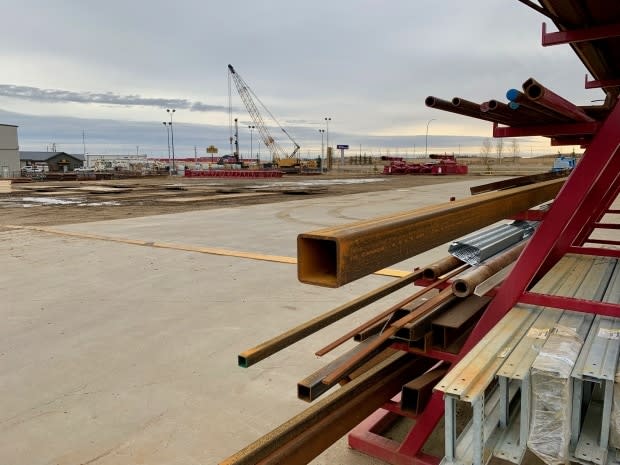'It's the smart thing to do': Canadian oil driller moves all its rigs to the U.S.

It wasn't an easy decision for the management team at Citadel Drilling. They were a Canadian company, with Canadian workers, and they knew the Canadian oilpatch well.
It wasn't a cheap decision to make, either. Picking up a drilling rig and moving it south of the border would cost about $1 million. Moving just one rig amounts to 57 semi-trailer loads of equipment.
Two years ago, Citadel Drilling began moving its rigs to the U.S. The firm now has all six of its rigs operating in the Permian Basin, which covers part of western Texas and southeastern New Mexico, and more than 100 Canadian workers rotating in and out.
The decision was difficult for the company's executives. Although, in hindsight, it was a no-brainer.
CEO Dan Hoffarth says if Citadel Drilling had stayed in Canada, it wouldn't have survived.
"The company wouldn't exist. There just isn't enough activity here to support our operations," Hoffarth said in an interview.

Citadel's story isn't uncommon these days.
A significant exodus of crews and equipment to the U.S., including hundreds of drilling rigs over the past five years, reflects the depressed state of the industry in Western Canada. It also suggests any return to fortune for the sector is viewed as still years away.
Heading south
The collapse in oil prices began five years ago, and the oilpatch has struggled ever since. Even when prices have shown signs of rebounding, the sector hasn't been able to capitalize because of a lack of pipeline capacity to export the crude.
The Alberta government chose to limit oil production to boost prices and reduce storage levels in the province. The move largely achieved those goals, but there have been consequences, including a reduction in drilling activity.

In general, those in the industry say investors would much rather place their money in the U.S., where there is greater pipeline capacity and easier access to permits and licences.
Canadian drilling and service companies are increasingly looking to Texas and, to a lesser degree, other American states to make money.
"The Citadel story is just one of hundreds," said Mark Salkeld, who has worked in the industry in Canada and internationally for more than 35 years. He was previously the president of the Petroleum Services Association of Canada.
"Even the company I work for, CLEANTEK, has expanded into the U.S.," he said. "Frankly, that's saving our bacon."
CLEANTEK Industries leases equipment to the drilling and service sector.
"That's where the opportunity is," he said of the U.S. "It's the smart thing to do if you want to stay in business and survive."
Salkeld has seen this happen before. In the early 1980s, around the time of the federal government's National Energy Program, workers fled the province and a significant amount of oilfield equipment migrated south as well.
About a decade later, fortunes reversed. Salkeld remembers part of his job at the time was to go to Texas and start bringing the Canadian equipment north.
He's optimistic that one day the oilpatch in Western Canada will bounce back. Still, if and when that happens, it may take another few years for equipment and workers to return, he said.
"We will experience a gap with talent and with equipment."
WATCH: Citadel Drilling CEO Dan Hoffarth on what it would take to move rigs back to Western Canada.
Precision Drilling, one of Canada's largest drilling companies, has about 50 rigs working in Canada, compared to 65 in the U.S.
Citadel is a relatively small company with six drilling rigs. However, its rigs are considered to be among the most technically advanced in the industry.
The best pieces of equipment seem to be the first to leave Canada.
"Those are the best drilling technology in the world," Mark Scholz, president of the Canadian Association of Oilwell Drilling Contractors, said of the newer rigs.
"Those rigs are gone. I don't anticipate they will come back."
The modern rigs can cost more than $25 million and the financial returns in Western Canada aren't high enough, he said.
There are many reasons why drillers are moving rigs to the U.S., said Scholz, including the exchange rate of the U.S. dollar, which is about 30 per cent higher than the loonie. The day rates for drilling rigs are also about 30 per cent better in the U.S.
Crews can work year-round in the southern U.S. and the regulatory environment is less burdensome, he said.
In 2014, before the oil price crash, there were about 900 drilling rigs in Western Canada. Now, there are about 550. Since only about half of those are currently active, Scholz expects more of them will be sent to the U.S.
WATCH: Mark Scholz, president of the Canadian Association of Oilwell Drilling Contractors, on the many reasons Canadian drillers are moving rigs to the U.S.
As the best equipment leaves the country, the Canadian oilpatch could become less efficient, said Hoffarth, since "It takes longer to drill those wells now because you're doing it with a tier-two or tier-three rig."
Citadel Drilling still has a shop and equipment yard in Nisku, just south of Edmonton, although the property is largely empty.
The company may leave Alberta altogether, but at least for now, Hoffarth said he will keep its headquarters in Calgary.
"At this point, yes."

 Yahoo Finance
Yahoo Finance 